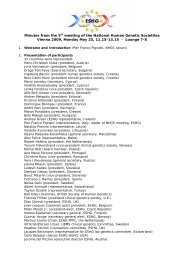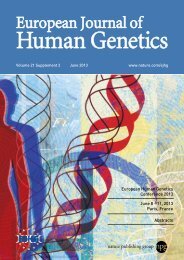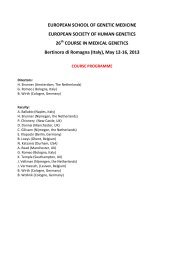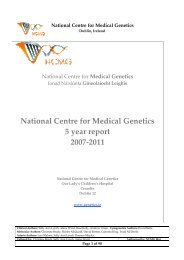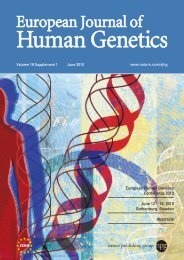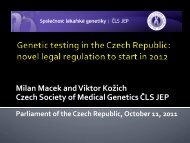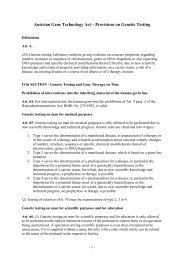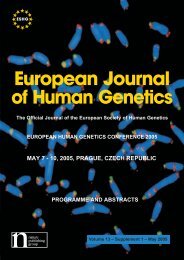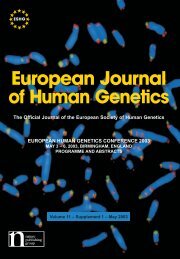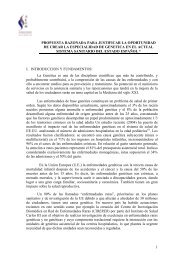2008 Barcelona - European Society of Human Genetics
2008 Barcelona - European Society of Human Genetics
2008 Barcelona - European Society of Human Genetics
You also want an ePaper? Increase the reach of your titles
YUMPU automatically turns print PDFs into web optimized ePapers that Google loves.
EMPAG Posters<br />
this group <strong>of</strong> men with decision support, and we anticipate that men<br />
will report better understanding <strong>of</strong> different risk management strategies<br />
and increased consumer satisfaction and will be more involved<br />
in decision-making .<br />
EP12. Family dynamics and genetic<br />
conditions<br />
EP12.1<br />
Perceived impact <strong>of</strong> BRCA1/2 testing on familial relationships<br />
and association with psychological distress<br />
M. Dorval, K. Bouchard, E. Maunsell, S. Camden, J. Simard;<br />
Université Laval, Québec, QC, Canada.<br />
Objectives: This study describes the perceived impact <strong>of</strong> BRCA1/2<br />
testing on relationships with first degree relatives. It also assesses<br />
whether experiencing a negative impact on relationships is associated<br />
with psychological distress and whether a positive impact is protective<br />
against distress .<br />
Methods: A total <strong>of</strong> 636 French-Canadian women from 236 families,<br />
who underwent BRCA1/2 testing in the context <strong>of</strong> the INHERIT BRCAs<br />
program between August 1998 and July 2004, were enrolled . Among<br />
them, 44% had already had cancer; 131 women were found to be mutation<br />
carriers, 172 non-carriers, and 333 had an inconclusive result .<br />
Questionnaires completed at pre-test and then at 1, 12, and 36 months<br />
post-disclosure were used to assess the perceived impact <strong>of</strong> testing on<br />
family relationships and psychological distress .<br />
Results: Three years post-disclosure, 11% <strong>of</strong> women perceived that<br />
testing has a positive impact on their familial relationship compared to<br />
only 3% who perceived that the impact was negative . Among mutation<br />
carriers, these proportions reach 16% and 7%, respectively . After controlling<br />
for a range <strong>of</strong> socio-demographic, medical, and psychosocial<br />
factors, experiencing a negative impact on relationships with a firstdegree<br />
relative was significantly associated with long-term distress<br />
(p=0 .04) . However, the perception that genetic testing had a positive<br />
impact on relationships was not protective against distress .<br />
Conclusions: Although the perception that genetic testing had a negative<br />
impact on family relationships is associated with long-term distress,<br />
this is quite infrequent . More research is needed to better understand<br />
how the impact <strong>of</strong> BRCA1/2 testing on family dynamics may<br />
affect individuals’ quality <strong>of</strong> life .<br />
EP12.2<br />
social intervention in the context <strong>of</strong> presymptomatic testing for<br />
late-onset neurological disorders<br />
N. Oliveira, J. Pinto-Basto, J. Sequeiros;<br />
IBMC, Porto, Portugal.<br />
These diseases have several social and psychological implications<br />
(structural, processing, cognitive, emotional changes) . Social intervention<br />
should be based in the systemic concept: good balance between<br />
psychodynamics demands <strong>of</strong> illness and family dynamics and their<br />
resources is determinant for the adaptation process and confrontation<br />
with the illness .<br />
In our protocol <strong>of</strong> presymptomatic testing, the social worker assesses<br />
two groups <strong>of</strong> risk factors: (1) vulnerability centred on the subject (the<br />
genetic risk, personality resources, cognitive resources, etc .); and (2)<br />
vulnerability connected with inadequacy <strong>of</strong> the environment (familial<br />
structure, separation or death <strong>of</strong> a parent, chronic disease, economical<br />
fragility/poverty, social isolation, etc .) .<br />
Social Intervention is carried out through (1) exchanges holding emotional<br />
positive attitudes; (2) (formal or informal) counselling, allowing<br />
the establishment <strong>of</strong> interactions that have the aim <strong>of</strong> sharing information<br />
on the disease; (3) material or instrumental support; (4) technical<br />
support or <strong>of</strong> services; and (5) access to new contacts . In terms <strong>of</strong><br />
social intervention, several people have also been helped with waivers<br />
for fees in health care (exemption from fees, medication, technical<br />
aids) (23); in the process <strong>of</strong> their incapacity retirement (10), pr<strong>of</strong>essional<br />
conversion or changes (5), in the process for fiscal (IRS) benefits<br />
(3), and help finding a nursing home, continued care unit or care<br />
at home (6) .<br />
Social intervention, in presymptomatic testing for late-onset, so far incurable,<br />
neurological diseases, has the aim to help the persons at-risk<br />
and their family to keep balance and functioning, when confronted with<br />
crises, such as test results or beginning <strong>of</strong> symptoms .<br />
EP12.3<br />
susceptibility to type 2 diabetes: perceptions and family<br />
communication regarding inheritance and primary prevention<br />
S. C. M. van Esch 1,2 , F. J. Snoek 1,2 , M. C. Cornel 3,2 ;<br />
1 VU University medical center, dept. <strong>of</strong> Medical Psychology, Amsterdam, The<br />
Netherlands, 2 VU University medical center, EMGO Institute, Amsterdam, The<br />
Netherlands, 3 VU University medical center, dept. <strong>of</strong> Clinical <strong>Genetics</strong>, Amsterdam,<br />
The Netherlands.<br />
Type 2 diabetes is a multi factorial disease, which means diabetes<br />
onset is triggered by interaction <strong>of</strong> (multiple) genes and environmental<br />
factors . Family history may serve as a good predictor <strong>of</strong> diabetes<br />
risk . People at risk can delay or possibly prevent diabetes by following<br />
a healthy lifestyle . We wonder whether this information is known by<br />
patients and whether they (are able or willing to) share it with their<br />
relatives .<br />
544 People diagnosed with type 2 diabetes filled in a questionnaire.<br />
It appears in most families talking about diabetes is not taboo . Most<br />
respondents indicate that ‘sometimes’ diabetes is discussed; mostly<br />
initiated by the patients themselves . Subjects include mainly diabetes<br />
related problems; less developing or preventing diabetes onset .<br />
Approximately half <strong>of</strong> the respondents knew about the inheritable character<br />
<strong>of</strong> diabetes; half <strong>of</strong> the group prefers more information provided<br />
by pr<strong>of</strong>essionals . A majority agrees on the potential role <strong>of</strong> patients<br />
informing their family; half <strong>of</strong> the group actually intends to do so . They<br />
indicated they knew what, how, and whom to tell . Approximately half <strong>of</strong><br />
the respondents believes patients should be coached by health pr<strong>of</strong>essionals<br />
. In the presentation, relations between demographic variables<br />
(including ethnicity), diabetes related factors (including illness perceptions<br />
and family history), knowledge on inheritance and primary prevention,<br />
and family communication will be outlined .<br />
In our opinion, the results may contribute to more targeted and effective<br />
health promotion strategies in diabetes prevention programs .<br />
However, we experienced quite different reactions, mostly in non-responders,<br />
discussing health issues in relation to family matters .<br />
EP13. Living with genetic disease<br />
EP13.1<br />
The long-term information and support needs <strong>of</strong> BRCA1/2<br />
mutation carriers<br />
V. L. Hunt1 , R. Iredale2 ;<br />
1 2 Peninsula Clinical <strong>Genetics</strong> Service, Exeter, United Kingdom, Institute <strong>of</strong><br />
Medical <strong>Genetics</strong>, Cardiff, United Kingdom.<br />
Genetic testing for inherited breast/ovarian cancer can have far reaching<br />
implications, both for the individual and their family . Research to<br />
date has mainly focused on the short-term impact <strong>of</strong> testing . The aims<br />
<strong>of</strong> this study were to explore the long-term impact <strong>of</strong> being identified<br />
as a BRCA1/2 mutation carrier, investigate the information and support<br />
needs <strong>of</strong> this group and explore best how cancer genetics services can<br />
meet these needs .<br />
Data was gathered using semi-structured interviews with women who<br />
had undergone genetic testing in Wales and had received a mutation<br />
positive result . The interview transcripts were thematically analysed to<br />
gain insight into participant’s thoughts and experiences .<br />
For these women their ‘genetic journey’ did not end upon receipt <strong>of</strong><br />
their test results. The findings suggest that BRCA mutation carriers<br />
may have specific needs for information and support that extend beyond<br />
the genetic testing process and that these needs may vary over<br />
time. A number <strong>of</strong> real or perceived barriers were identified which prevented<br />
participants from accessing support and information . Participants<br />
made valuable suggestions as to how cancer genetics services<br />
could address these issues .<br />
It is likely that no single intervention will be effective in addressing<br />
the needs <strong>of</strong> this heterogeneous group . Further large scale research<br />
is needed to investigate how best to target resources to meet client<br />
needs . This study explores the views <strong>of</strong> this group, highlighting issues<br />
that are important to them. The findings emphasise the fact that longterm<br />
user involvement is essential in the planning and optimising <strong>of</strong><br />
service provision .





